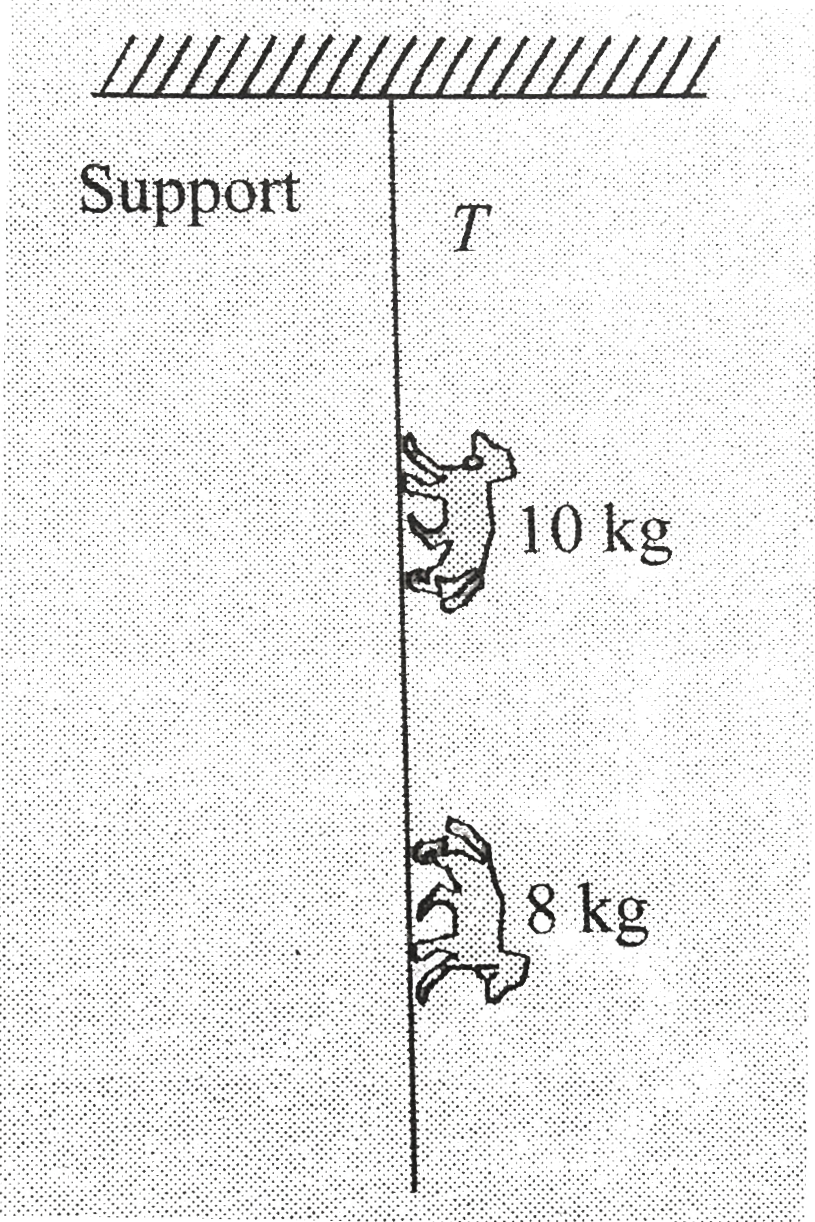A monkey of mass 40 kg climbs on a rope which can withstand a maximum tension of 600 N In which of the following cases will the rope break : The monkey
(a) climbs up with an acceleration of 6ms−2
(b) climbs down with an acceleration of 4ms−2
(c) climbs up with a uniform speed of 5ms−1
(d) falls down the rope nearly freely under gravity ? (Ignore the mass of the rope.)
To determine in which case the rope will break, we need to calculate the tension in the rope for each scenario and compare it with the maximum tension the rope can withstand, which is 600 N. The mass of the monkey is given as 40 kg.
1. Calculate the tension:
- When the monkey climbs up, the net force equation is:
T−mg=ma
- Rearranging gives:
T=mg+ma
- Substituting the values:
T=40×10+40×6=400+240=640N
2. Comparison:
- T=640N>Tmax=600N
- Conclusion: The rope will break.
---
Case (b): Climbing down with an acceleration of 4m/s2
1. Calculate the tension:
- When the monkey climbs down, the net force equation is:
mg−T=ma
- Rearranging gives:
T=mg−ma
- Substituting the values:
T=40×10−40×4=400−160=240N
2. Comparison:
- T=240N<Tmax=600N
- Conclusion: The rope will not break.
---
Case (c): Climbing up with a uniform speed of 5m/s
1. Calculate the tension:
- When climbing at a uniform speed, the acceleration is 0:
T−mg=0
- Thus:
T=mg
- Substituting the values:
T=40×10=400N
2. Comparison:
- T=400N<Tmax=600N
- Conclusion: The rope will not break.
---
Case (d): Falling down nearly freely under gravity
1. Calculate the tension:
- In free fall, the tension in the rope is 0:
T=0N
2. Comparison:
- T=0N<Tmax=600N
- Conclusion: The rope will not break.
---
Final Conclusion:
The rope will break only in case (a) when the monkey climbs up with an acceleration of 6m/s2.
- When the monkey climbs up, the net force equation is:
T−mg=ma
- Rearranging gives:
T=mg+ma
- Substituting the values:
T=40×10+40×6=400+240=640N
2. Comparison:
- T=640N>Tmax=600N
- Conclusion: The rope will break.
- When the monkey climbs down, the net force equation is:
mg−T=ma
- Rearranging gives:
T=mg−ma
- Substituting the values:
T=40×10−40×4=400−160=240N
2. Comparison:
- T=240N<Tmax=600N
- Conclusion: The rope will not break.
- When climbing at a uniform speed, the acceleration is 0:
T−mg=0
- Thus:
T=mg
- Substituting the values:
T=40×10=400N
2. Comparison:
- T=400N<Tmax=600N
- Conclusion: The rope will not break.
- In free fall, the tension in the rope is 0:
T=0N
2. Comparison:
- T=0N<Tmax=600N
- Conclusion: The rope will not break.
The rope will break only in case (a) when the monkey climbs up with an acceleration of 6m/s2.
Topper's Solved these Questions
- LAWS OF MOTION Book:NCERT ENGLISHChapter:LAWS OF MOTION Exercise:EXERCISE
Explore 40 Videos
- KINETIC THEORYBook:NCERT ENGLISHChapter:KINETIC THEORYExercise:EXERCISE
Explore 14 Videos
- MECHANICAL PROPERTIES OF FLUIDSBook:NCERT ENGLISHChapter:MECHANICAL PROPERTIES OF FLUIDSExercise:EXERCISE
Explore 31 Videos
Similar Questions
Knowledge Check
A monkey of mass 40 kg climbs on a massless rope which can stand a maximum tension of 500 N. In which of the following cases will the rope break? (Take g=10ms−2)
 AThe monkey climbs up with an acceleration of 5ms−2.BThe monkey climbs down with an acceleration of 5ms−2.CThe monkey climbs up with a uniform speed 5ms−2.DThe monkey falls down, the rope freely under gravity.
AThe monkey climbs up with an acceleration of 5ms−2.BThe monkey climbs down with an acceleration of 5ms−2.CThe monkey climbs up with a uniform speed 5ms−2.DThe monkey falls down, the rope freely under gravity.A mass of 1 kg is suspended by means of a thread. The system is (i) lifted up with an acceleration of 4.9ms2 (ii) lowered with an acceleration of 4.9ms−2. The ratio of tension in the first and second case is
A3:1B1:2C1:3D2:1
A man of 60kg mass is in a lift. Find the apparent weight of the man when the lift is moving (a) up with uniform acceleration 4ms−2 (b) down with uniform acceleration of 2ms−2 (g=10ms−2)
View SolutionTwo monkey of masses 10 kg and 8 kg are moving along a verticle rope as shown in fig. the former climbing up with an acceleration of 2ms−2, while the later coming down with a uniform velocity of 2ms−2. Find the tension in the rope at the fixed support.

View SolutionA man weighing 60 kg is in a lift moving down with an acceleration of 1.8 ms−2. The force exerted by the floor on him is
View SolutionA balloon os mass 2 KG is rising up with an acceleration of 4ms2 . The upward force acting on the balloon is (g = 10 ms^-2)
View SolutionA balloon with its contents weighing 160 N is moving down with an acceleration of g/2 ms−2 . The mass to be removed from it so that the balloon moves up with an acceleration of-g/3 ms−2 is
View SolutionA money of mass 40 kg climbs up a rope, of breaking load 600 N hanging from a ceiling. If it climbs up the rope with the maximum possible acceleration, then the time taken by monkey to climb up is [length of rope is 10 m]
View Solution